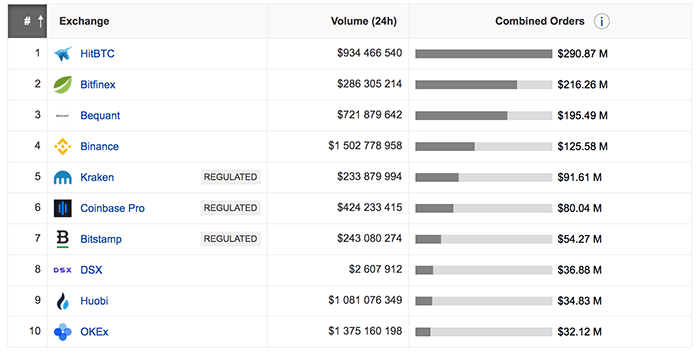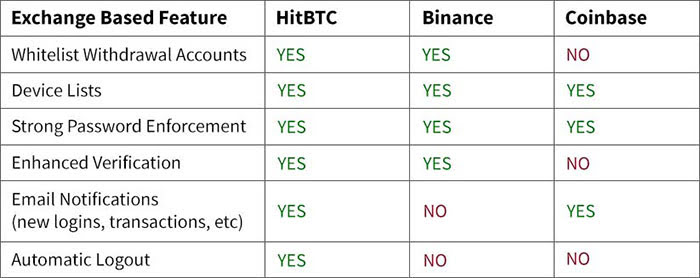Table of Contents
- The crypto exchange landscape
- Security analysis of popular fiat to crypto and altcoin exchanges
- Keeping up with traditional security standards
Trusting others with your money is difficult, as it always seems like someone is out to get you. The crypto world is certainly plagued with its fair share of hackers and exploits, but that doesn’t mean all companies are to blame. Exchanges are usually the target of our ire, though this feeling is often misplaced. There are issues that all exchanges face, and in most situations, it isn’t the issues themselves that we should pay attention to but rather how the exchanges handle them.
Exchanges are in the forefront of the crypto world, and without them we wouldn’t have the growing crypto economy that we see before us. There are hundreds of exchanges, and customers can pick from a seemingly endless list when it comes to where they want to exchange their currencies. But, as is the truth with many things, you get what you pay for. Exchanges have to worry about fake Google ads, managing their reputation, hacks, regulations, marketing, maintaining their entire back end, and more. By using all these problems and issues as indicators of success, are there any exchanges that are leading the pack?
The crypto exchange landscape
Before we can really delve into the depths of the problem, we first need to understand what exchanges we can use in our day-to-day trading activities. Exchanges come in a variety of shapes and forms, so let’s review them real quick.
Coinbase, Kraken, Gemini: These exchanges are typically more limited in the variety of coins they offer and stick to the larger cryptocurrencies (BTC, ETH, BCH, LTC, XRP, etc.). As they are allowing fiat deposits you have to verify your identity through KYC/AML procedures.
Advantages: The main advantage of these exchanges is ease of use, as you literally just click a “buy” or “sell” button when you want to exchange crypto. You typically link your bank account to deposit money, and so long as you stick to the major fiat to crypto exchanges you shouldn’t have too many problems. The advantages of this type of exchange are sometimes negated since altcoin exchanges have started offering users the ability to buy crypto using fiat.
Disadvantages: Fees are almost always higher on these markets than their competitors, and they come in a variety of forms: deposit fees, withdrawal fees, transaction fees, etc. Additionally, users who keep their coins on these types of exchanges do not control their private keys, so in reality they don’t actually “own” their coins.
HitBTC, Binance, OKEx: These exchanges are similar to the ones discussed above, except that they do not deal in fiat - only coin to coin trading. The main focus of these exchanges is to give altcoins a place to live, trade, and thrive, and because of this they often list hundreds of altcoins at any given time.
Advantages: A large number of coins, sometimes hundreds more than fiat-to-crypto exchanges, means that you aren’t limited in your trading options. Altcoins have been known to produce amazing ROI, though they don’t come without risk.
Disadvantages: Some people will consider the lack of fiat trading a disadvantage, but since some of them, like HitBTC, offer an in-platform way to purchase BTC with fiat (just not the trade pairs involving it), this disadvantage is pretty moot.
Security analysis of popular fiat to crypto and altcoin exchanges
These two types of exchanges, although they aren’t the only options for users, still dominate the market in terms of popularity, user counts, and total trade volumes. We will look at the top exchanges for each category and see how they handle crypto-related issues, hacks, and their ability to support their customers. For fiat-to-crypto exchanges, Coinbase is definitely a market leader, while for altcoin exchanges we will look at both Binance and HitBTC, the former because of its market volume dominance and the latter because it leads globally in total altcoin listings.

Source: coinpaprika.com
Common Issues
These include user side errors like email hacking, phishing, account hijacking, social engineering in general, and more. Although there isn’t much an exchange can do to directly combat this (it is ultimately up to the users), they can still make it harder for hackers to completely clean out an account after gaining access. The main features to protect from these issues, and which of the three exchanges implement them, are as follows:

Coinbase falls behind in this field, which is a huge bummer since they are one of the largest exchanges in the United States. Binance and HitBTC have similar features, but HitBTC pulls a bit ahead by providing simple things like automatic logout and a time-lockout feature for their whitelisting of accounts.
Hacks
Exchanges aren’t impenetrable, as we have all read about the Binance hack where they lost $40 million, and although they have worked on revamping their security since then that is still a major knock against them. Coinbase and HitBTC have never been hacked directly, though there are many unfortunate reports on the Internet of Coinbase users suffering from a SIM swap hack that gives bad actors access to Coinbase accounts. These hacks could be prevented by Coinbase enforcing 2FA through authenticators instead of SMS, and by also offering greater security features like IP filtering and whitelisting withdrawal accounts.
Customer Support Options
This is where you’d hope an exchange would excel, since people are often managing small fortunes through their servers. There is nothing worse than having an exchange go down or experiencing a technical error while you are trying to withdrawal your funds or buy a dip. Luckily, this is where great customer support options come into play. Coinbase was pretty notorious for their awful support, but in Feb of 2018 they vowed to improve on their blog. After undergoing a 90-day growth period and promising further updates, they basically stopped updating their blog and once again offer only mediocre service. All this time HitBTC has been undertaking a huge effort on their social media platforms to ensure customers are satisfied after posting their issues.
HitBTC, on the other hand, seems to always be actively working hard to not only improve their customer service department, but to also decrease their turnaround time on tickets and increase the ways that customers can reach them. With these exchanges there are a few tiers of support, the highest offered to their customers who have undergone enhanced verification. Once you fulfill all KYC/AML procedures you’ll receive prompt support by real humans, not bots like so many companies resort to these days.
Keeping up with traditional security standards
The real test, though, is seeing how crypto exchanges compare to their traditional counterpart, stock trading companies. Obviously, the markets are a bit different since brokers don’t exist in the same way in crypto, but we can look at companies like E*Trade and TD Ameritrade and see how high traditional security standards are.
The first, and most apparent thing when investigating traditional companies, is the lack of updates security options. E*Trade, for example, has a lot of touted server-side securities, but when it comes to protecting customer accounts the extent of their security pretty much stops at 2FA. TD Ameritrade is a bit better, since they offer 2FA in addition to four security questions that they can use to verify you are you, but with data leak after data leak, security questions are becoming more useless every day.

Source: xkcd.com
It shouldn’t come as too much of a surprise that crypto exchanges like HitBTC, which are based on a technology that is revolutionizing tons of industries, are actually at the forefront of protecting customers with new, ever-improving security features. These companies understand the importance of social media, understand that users don’t always want to call a hotline and be put on hold for hours on end, and that the way we seek help from companies has changed; most importantly though they understand that the crypto world demands higher security than its traditional counterpart. If they can stay on top of the game by providing continually solid service, ever-improving security features, and continually interacting with their users in a positive way they will set the bar high for the rest of the industry.
Investment Disclaimer






